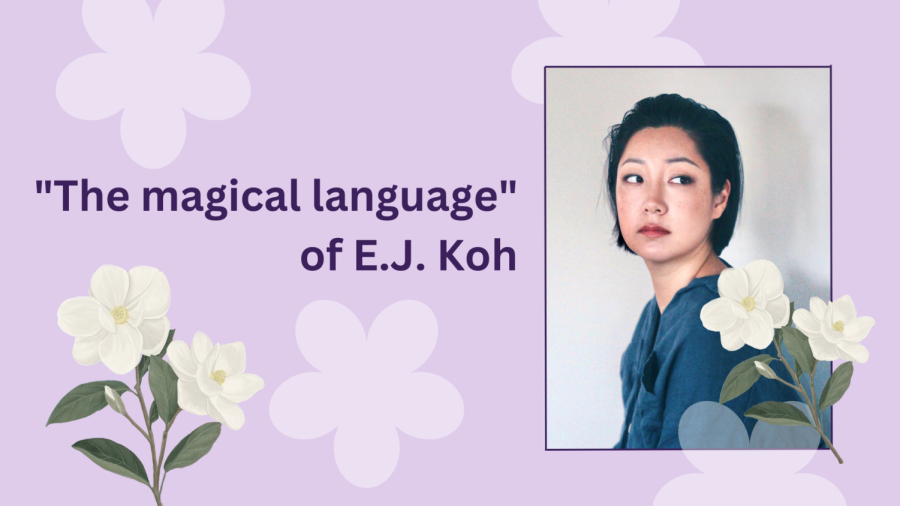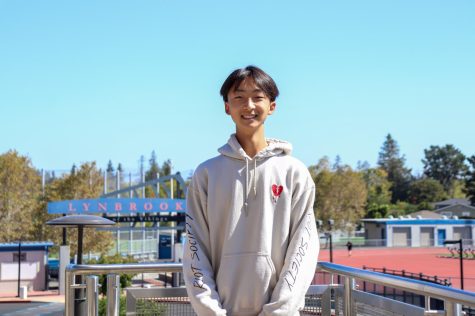E.J. Koh’s “magical language” captivates students
Graphic illustration by Inaaya Yousuf and Vidushi Upadhyay. Photo by Inaaya Yousuf.
Author E.J. Koh explores themes of cultural identity with Lynbrook students during her virtual author visit.
May 8, 2023
On May 3, San Jose-born poet and author E.J. Koh spoke with Lynbrook World Literature students, who listened intently as they learned of the struggles and triumphs Koh experienced while caught between his two cultures. Based on her experiences as a second-generation Asian American, Koh wrote “The Magical Language of Others,” a memoir filled with raw and emotional storytelling that delves deep into the complexities of family relationships, cultural identity and power of language. The book, newly introduced this year to diversify the World Literature curriculum, gave students a glimpse into a unique, yet relatable story.
“The book is a refreshing change from the others we read this year because of how relatable it is,” sophomore Brian Kao said. “Although we aren’t exactly the same, I felt like she told a story that I endured and experienced.”
Koh’s memoir takes readers on a journey through her teenage years when she lived in Davis, California with only her older brother after her parents moved to Seoul, Korea for her father’s career. Feeling a deep sense of abandonment, Koh struggled to find her identity and sense of belonging, unwilling to forgive her mother for leaving. The memoir weaves together letters that her mother wrote to her in Korean, stories of her ancestors and Koh’s own experiences discovering who she is.
“There are some parts of it that some Lynbrook students may not connect to at all, like her parents living in a different country for a majority of her life,” sophomore Arnav Singhal said. “But the story of an Asian protagonist who has struggled with her parental relationships is very relatable to many of us.”
Although this is the first year that “The Magical Language of Others” is being taught in Lynbrook’s curriculum, Cupertino High School taught the book in the 2021-22 school year. In 2020, the district’s World Literature teachers were looking to add diversity to the largely eurocentric English curriculum. When “The Magical Language of Others” was published in January of that year, Cupertino World Literature teacher Lynn Chen, who knew Koh personally, suggested taking a more modernized approach to AAPI literature with Koh’s memoir.
“It was just great to have what I felt were both familiar and unfamiliar Asian experiences represented,” Chen said. “I appreciate that it helped my students — a lot of them being from an Asian American background — have some really great conversations about the ways that we receive or don’t receive love from our immigrant parents.”
The teachers loved the book and felt it reflected the diverse student experiences on campus as it explores themes of cultural identity and family relationships, which many students grapple with. Many students expressed comfort in being able to resonate with the memoir’s perspective on these issues.
“It is one of the only AAPI texts that we would get the chance to read throughout our whole high school career,” sophomore Sophie Mak said. “It’s an important book to me because it shows how life truly is for Asian Americans in America.”
The idea for the author visit started when a student emailed Koh with a burning question about the book that they could not find an answer to anywhere else. This sparked an idea in the mind of the student’s teacher, Anna Kirsh, who invited Koh to speak with her students directly about the book and her experiences.
“It’s a complex book because it’s hard for us to try to interpret someone’s feelings and experiences,” Kirsh said. “Being able to ask her directly gives us some validation and she can explain her thoughts better than we can probably interpret them.”
Three Lynbrook World Literature teachers worked together to make the visit possible, and having a connection to Koh through Chen made the planning process easier as well.
On the day of the visit, Koh called in from Seattle, Washington through Zoom. Koh engaged with the students through a Q&A, explaining her motivations behind writing the memoir and her thoughts on the themes explored in the book. Students were able to share their own thoughts on the book and its themes, fostering an inclusive environment where students connected with each other openly. The emotional and personal nature of “The Magical Language of Others” along with Koh’s vulnerability in sharing personal experiences fostered deep connections between students and the novel.
“You could tell Koh was really emotional throughout the event and her responses showed that she was like living in that moment,” Singhal said. “It was a really good experience because I was able to talk to someone who actually overcame all those difficulties.”
By talking with students live, Koh was able to humanize the words on the page and help unveil messages beneath the surface. The visit not only served as an opportunity for students to connect through literature but also to understand how to empathize with people whose perspectives may differ from their own. It also highlighted the importance of diversity in school literature curricula.




























































